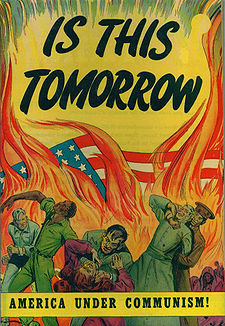Think of this as Volume 14, Number 1 of A-Clue.com, the online newsletter I've written since 1997. Enjoy.

This despite the fact that the President and his party leaders remain far more popular than their Republican counterparts. Republicans keep playing the stupid card, having long ago turned the politics of George W. Bush into Bushism, never mind the reality.
The differences between modern conservatism and Soviet-style Communism grow smaller every day. Bush himself merely failed the ideology, yet somehow is not responsible. The ideology can never make mistakes. While tea baggers proclaim their concern about "deficits," ask them what they would really have done differently than St. George the Saddam Killer. Would they have not fought the war? Not had the tax cuts?
"Deficit" is just something they're saying. They still want to go on "offense" against "terrorists," as Dick Cheney proclaims. They still think the solution to every domestic problem is tax cuts. They still give false comfort to the comfortable and enjoy afflicting the afflicted.
What Republicans are offering the public today are ideology and a pony. That is, belief and assumptions. The reality of Republican rule is playing out now in California, and it's not pretty. It's not what the American people want.
The biggest problem faced by today's Netroots is actually the large Democratic majority in both the House and Senate. This problem did not face Nixon and the movement conservatives of 1970. They were a minority in both Houses, and thus could find plenty of targets of opportunity.
Let's look at the lesson of 1970, and remember that roles are reversed. If you're a liberal, looking back at that time, you're rooting for the conservatives.
The result of the 1970 election was a gain of 3 seats for the GOP, giving them a 46 member minority. This included James Buckley, who was elected as a Conservative, and Harry Byrd of Virginia, elected as an independent. Nixon's resulting conservative majority was bipartisan, with Southern
Democrats usually voting with the President along with moderate
Republicans.
On the surface very little change. In fact it was seen as an endorsement of the President's policies, and set Republicans up for a political lifetime.
This White House sees itself as playing defense, and that is a losing game during hard times. Trying to re-elect Chris Dodd or Blanche Lincoln isn't going to fire anyone up. The way you fire up people is by being against.
What this means to me is that, as in 2004, the Netroots are on their own. This sounds like a bad thing but it should be tremendously liberating. It means the Netroots can let the perfect be the enemy of the good. It means they can and should be running primaries, even against vulnerable conservative Democrats. It means they should be seeking their own James Buckleys.
Gains are possible. Just remember the lesson of history.
The rising tide plays offense.

So what should we be looking at? Rather than starting with candidates, let's start with groups. Specifically, the Progressive Change Campaign Committee and ActBlue are the groups to watch. They can recruit candidates, they can target races, they work together and can raise a stink. They are at the heart of the Vast Left Wing Conspiracy your kids will be complaining of 40 years from now.
Arkansas Senate — Bill Halter is the state's Lt. Governor and seriously considering a challenge to embattled Sen. Blanche Lincoln. This could turn out to be the Lamont-Lieberman race of 2010, except Lincoln has no chance if she loses the primary.
Pennsylvania Senate — Joe Sestak (above) is the play here. Sestak, a former Admiral who took out a Republican incumbent in 2006, has proven an enthusiastic Netroots Democrat. Party-switchers are never popular, and Arlen Specter would be a very weak general election candidate, fighting an immense enthusiasm gap.
North Carolina Senate — Cal Cunningham is the Netroots candidate. A 36 year old litigator with the law firm of Kilpatrick Stockton, he could do just what John Edwards did in 1998, come out of nowhere to beat a Republican incumbent. It's his lack of a deep public record that gives him an advantage over more conventional choices like Elaine Marshall and Ken Lewis.
Ohio Senate — Jennifer Brunner announced nearly a year ago. She is best known for having knocked out Ken Blackwell, who was given credit (by some) for putting Ohio in the Bush column in 2004. Much of her fundraising is coming through ActBlue.
It is unfortunate that Senate campaigns have to start a year ahead of an election, because there are often primaries and because statewide races are very expensive. None of the people listed above are favored. Most are underdogs within their own party primaries. Which is the point. When a movement is in the majority party, its most effective move is to tie that party more closely to the movement. It's only after a movement is out of power, and desperate for some love, that it makes sense to primary.
For this reason you might wind up adding the Florida Senate race to this list. While it's true that conservative darling Marco Rubio is said to be well ahead in current general election polls the fact is that his likely opponent, Kendrick Meek, is relatively unknown statewide.
With a hard right Republican a Democrat in Florida has upside.










